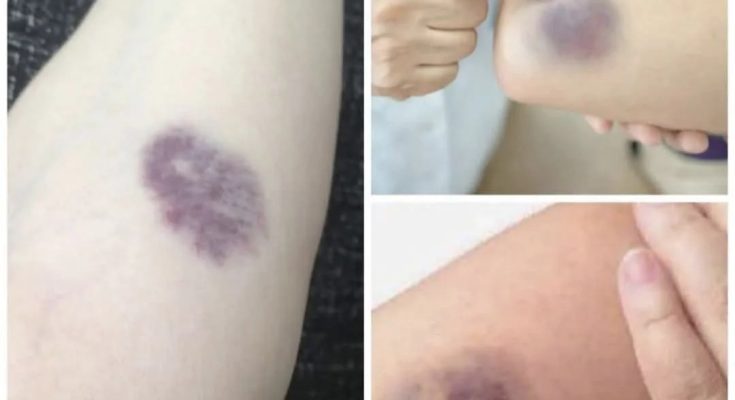Have you ever noticed that you bruise easily? You know what we mean. Those black and blue marks that look unsightly, and even after time turns them yellow, they aren’t any prettier. Not only do they look scary, but in some instances they can also be painful. And sometimes they’re a cause for concern because they may mean that you have an underlying medical problem, and it could be serious.
In today’s blog, we’re going to share some of the reasons why bruising occurs and offer some tips to address the issue, hopefully allowing you to prevent future bruising or, figure out why your body is sending you this signal that something might be amiss.
Oh, and here’s a hint about one possible cause: let’s just say you can add bruises as one more potential thing that may result from a lack of specific vitamins. More to follow on that.
Ecchymosis. That’s the medical term for bruising. It sounds as icky (that’s a non-medical term) as your bruises may look.
A bruise is what happens when small blood vessels burst underneath your skin’s surface, causing the blood to spill out from the capillaries and form a puddle just underneath the skin (as opposed to when you cut yourself and the blood pours out). There are lots of reasons as to why bruises happen, but some of the medical conditions associated with bruising may not necessarily cause the actual bruise but may make you more vulnerable to bruising.
Bruising also generally occurs when there’s been some acute trauma that’s happened to your skin. You accidentally bumped into your coffee table or walked into a wall or banged your arm against your night table, maybe even while you were sleeping. Or perhaps you’ve had your blood taken and it’s left a bruise, likely because your veins weren’t popping that day.
Whether you remember what happened or not, you’ll remember what a bruise looks like. Generally, a dark mark, like red or black or blue. Over the next several days, you’ll see the colors change, kind of like the trees changing in the fall, but not as pretty. Going to purple or red, then green or yellow means the blood is being reabsorbed by your body and that the bruise is healing, until eventually there’s no tell-tale sign left.
Read more about the changing colors and the timeline of bruises here.
More About Bruises
Usually, the bruises show up on your arms or legs and they are not generally a cause for concern. However, if your bruises show up on your stomach, buttocks, genitals, ears or the back of your hands, or they occur more frequently, or don’t improve and start to change colors within a few days, or if they last longer than two weeks or so, talk to your doctor.
BLOG: Does Vitamin D Deficiency Cause Bruising?
We’ve blogged before about the some of the problems you might encounter if you’re low in some vitamins, such as vitamin D for instance. If you’re not getting enough vitamin D or some of the B vitamins, you may be making yourself more susceptible to bruising.
Here are two more vitamin insufficiencies that could lead to frequent bruises:
Vitamin C Deficiency
When you’re not getting enough vitamin C in your diet, from the foods you eat (e.g., citrus fruit, tomatoes, broccoli, etc.) to the dietary supplements you take, you may be low on this vitamin—especially if you’re a smoker.
Collagen is a protein that keeps your blood vessels healthy; vitamin C helps your body produce collagen. Without enough vitamin C, you may not have enough collagen. Without the right amount of collagen, the more fragile your blood vessels may become—all of which means you’re more likely to bruise easily or more frequently.
Vitamin K Deficiency
Vitamin K may not be the vitamin that’s most top-of-mind. But if you’re vitamin K- deficient, your blood might be slower to clot, leading to too many bruises. Vitamin K also strengthens capillary walls and stronger capillary walls means they’re less likely to break and leave you with bruises.
BLOG: Exploring Symptoms of Vitamin K2 Deficiency
Other Dietary Supplements
Other over-the-counter dietary supplements, in addition to vitamins C, K, D, and some of the Bs, can lead to frequent bruising. Some botanical supplements, including ginkgo, ginseng, ginger and garlic, can act as natural blood thinners. That can be beneficial, but it may also make it more difficult for your blood to clot leading to easier bruising after an acute trauma to your skin (and potential other problems).
Even omega-3 fatty acids, saw palmetto or vitamin E can contribute to bruising, due to their potential effects on blood platelets, says this article.
BLOG: How to Tell if Your Fish Oil Capsules are Rancid
This is where testing for your vitamin and nutrient levels can play an important role. Testing allows you to know your numbers. Once you know them, you can make dietary changes to increase your vitamin intake or make decreases in the amounts you’re taking if you’re higher than optimal range. There are also blood tests for clotting conditions. Talk to your doctor.
Other Possible Causes of Bruising
Medications—If you’re on prescription blood thinners or regularly take aspirin or ibuprofen, your body might have trouble with blood clotting. In addition, steroids can make your skin more fragile and some antibiotics or antidepressants may also be the reason you’re more easily bruising. Aging—you’ve heard of being thin-skinned? In this case, we’re not talking about having your feelings easily hurt. The fact is that as you age, your skin gets thinner as you lose the fatty layer underneath. Aging also causes your blood vessels to weaken. The sun—years of basking in the sun may lead to weakening the walls of your blood vessels which, in turn, makes your skin more susceptible to frequent bruising. Medical conditions—diabetes, blood diseases (e.g., hemophilia) and blood cancers (e.g., leukemia, lymphoma) and iron deficiency anemia may make you more prone to blood vessel damage, blood clotting problems, or inefficient blood circulation. Excessive bruising may also be a sign that you have a serious medical problem like one of these conditions. Contact sports injuries—muscle contusions are the second leading cause of sports injuries (strains, being the first), according to this post. These bruises, which occur in children too, can be caused by a direct blow to the body causing surface skin damage, and possibly to deeper tissue. The term bruise and contusion are pretty much the same thing.
Treatment Options for Frequent or Excessive Bruising
If you’re bruised and it bothers you, try the suggested remedy for inflammation—RICE—not the food. In this case, RICE stands for rest, ice, compression and elevation. Then after a few days, try applying a heating pad to the injured area. The Cleveland Clinic also suggests taking an over-the-counter pain medication, such as acetaminophen (but remember that aspirin or ibuprofen might actually be part of the problem).
If your bruises are a result of falls (especially in the night), make sure your home lighting is sufficient (and turn on the lights if you’re heading to the bathroom and you’re just waking up), avoid floor clutter including those pretty throw rugs that are easy to slip on, and keep your multitude of electrical cords in a tidy fashion (wall plugs, perhaps?).
If you think your bruises are a result of your dietary supplement routine, don’t just be suspicious, find out if you can test to see if your vitamin levels are too low. Learn more about whether your botanical supplements are causing a blood-thinning effect that’s not the right thing for you. Hopefully you have a doctor who is attuned to the potential benefits and issues with dietary supplements.
Especially if you have thin skin, keep an eye on those bruises to be sure that the skin is not breaking as open skin is an invitation for infection to set in. Ask your doctor what protective ointments or creams will be most effective and whether you should bandage the area up.
Most bruises are likely to heal on their own. But if yours are not going away or are happening more than you’d like, asking your doctor to help your figure out what is causing the bruising makes perfect sense. For instance, if you’re bruising because of your diabetes, it’s another reminder to test your glucose levels and manage those levels as best as possible.
If, in fact, your bruises are related to serious medical conditions, you’ll want to know that so you and your doctor can figure out the next steps.
To read more about bruising, click here, here and here.
VIDEO: How do you know if you are getting to a healthy vitamin D level?



